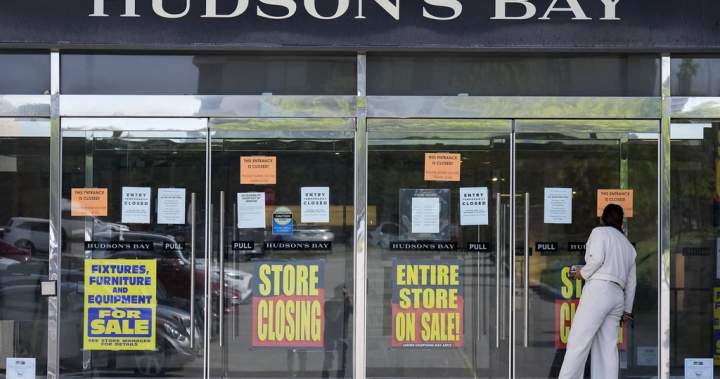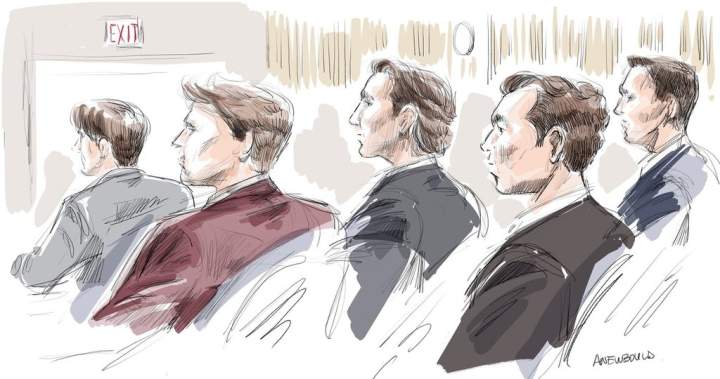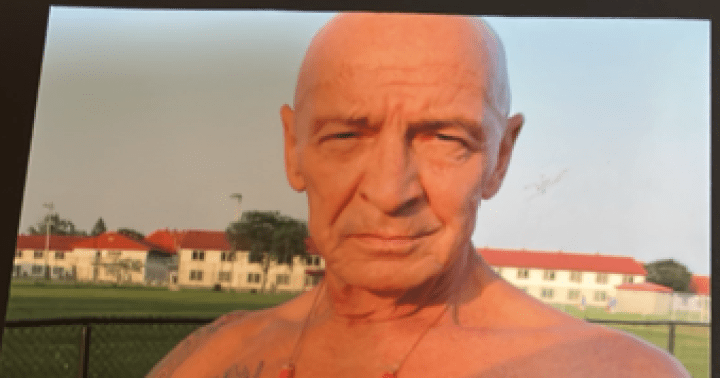Uncategorized
More Hudson’s Bay lease deals reached

Hudson’s Bay has reached deals to sell the leases of six store locations as legal wrangling continues on work to close a deal to sell up to 25 leases to B.C. billionaire Ruby Liu.
Legal filings show clothing retailer YM Inc. has struck a deal to buy five leases for $5.03 million, while it was unable to secure landlord approvals for three other locations.

Get daily National news
Get the day’s top news, political, economic, and current affairs headlines, delivered to your inbox once a day.
The five leases include Vaughan Mills in Vaughan, Ont., Tanger Outlet in Kanata, Ont., Outlet Collection in Winnipeg, CrossIron Mills in Rocky View, Alta., and Toronto Premium Outlets in Halton Hills, Ont.
Separately, Ivanhoe Realties Inc. has agreed to pay $20,000 for a lease at Metrotown in Burnaby, B.C., that its parent company Ivanhoe Cambridge owns.
Hudson’s Bay put its leases up for sale earlier this year, after it filed for creditor protection and closed its 80 stores and 16 under its sister Saks banners.
Three leases which sold for $6 million were already transferred to Liu who wants to buy 25 more to open a department store.
© 2025 The Canadian Press
Uncategorized
World juniors case raises consent questions, but appeal unlikely: experts

An appeal by Crown prosecutors of Thursday’s acquittal of five hockey players in the high-profile world juniors sexual assault case is unlikely, legal experts say, despite questions about whether consent was properly considered.
Michael McLeod, Carter Hart, Alex Formenton, Dillon Dubé and Cal Foote were found not guilty of all charges after a weeks-long court case that centred on an alleged group sexual encounter in London, Ont., in 2018, in which the players had been accused of non-consensual sex.
The Crown has 30 days to decide whether to appeal the decision to a higher court.
In her ruling, Ontario Superior Court Justice Maria Carroccia said she did not find the female complainant, known as E.M. in court documents due to standard a publication ban, “credible or reliable.” She also dismissed the Crown’s argument that E.M. had only consented out of fear.
“This case, on its facts, does not raise issues of the reformulation of the legal concept of consent,” she said in her decision.
While those statements and others made by Carroccia have been criticized, even legal experts who take issue with them say they may not be sufficient grounds for an appeal.
“I don’t agree with the way that the judge came to her decision, but the decision is really well-reasoned,” said Daphne Gilbert, a legal professor who teaches courses on sexual assault law at the University of Ottawa.
“Appeal standards aren’t just that you disagree with the result. You have to to show an error in law. And I don’t see an error in law in the decision itself.”

How the legal definition of consent factors in
Melanie Randall, a Western University law professor whose research includes women’s autonomy rights, said Canada’s “extremely progressive statutory definition of consent” in criminal law means “we’re not looking for the ‘no,’ we’re looking for the ‘yes.’”
In other words, she said, a judge or jury must take into account the female complainant’s own mindset behind her decision to consent to a sexual act, and determine if that consent is truly voluntary, which can be a subjective assessment.
The court heard during the trial that E.M., who testified she was drunk and not of clear mind, was in the washroom after she had consensual sex with McLeod on the night in question and came out to a group of men in the room allegedly invited by McLeod in a group chat.
It was then that the Crown alleged several sexual acts took place without E.M.’s consent.

Get breaking National news
For news impacting Canada and around the world, sign up for breaking news alerts delivered directly to you when they happen.
Defence lawyers suggested E.M. wasn’t as drunk as she said she was, wanted a “wild night” with the players, was “egging” them on to have sex with her and accused her of having a “clear agenda” during the court process, which was a judge-only trial.
E.M. pushed back against those claims and at points outright rejected them, saying she was coaxed into staying in the room and was disrespected and taken advantage of by the group, who she said “could see I was out of my mind.”
“E.M. was unwavering in telling the court that she did not consent, she did not want this, she did not provide her voluntary agreement,” Randall said.
“She explained in excruciating detail why it was complex for her to cope in that situation where she felt threatened and unsure of how to respond, and I think used a lot of strategies of appeasement and acquiescence.”

Although Randall agreed that the decision itself was legally sound, she believes Carroccia “went much further than she needed to” in the analysis of consent by ruling E.M.’s consent was voluntary.
“The judge basically said one of two things: either she knows better than E.M. does what her own subjective state was, or E.M. is a liar,” Randall said. “I think those are two very unfortunate and damaging consequences of this decision.”
Gilbert said a possible appeal could be launched on the allegation the judge was biased against E.M., but called that “kind of a nuclear option.”
“Usually you wouldn’t accuse a judge of bias from what they write in a judgment, because they’re actually making explicit the reasons upon which they made their decision,” she added.
“Bias arguments are more likely to come from attitudes in the courtroom or things that were said in the courtroom that then you felt contributed to a wrongful verdict.”
She suggested the judge could have done more to rein in the defence lawyers in their cross-examination of E.M., which the complainant’s lawyer Karen Bellehumeur said after the verdict Thursday was at times “insulting, unfair, mocking and disrespectful.”
“A fair trial is one where decisions are made based on the evidence and the law, not on stereotypes and assumptions, and where the trial process respects the security, equality and privacy rights of the victim, as well as the accused persons,” Crown attorney Meaghan Cunningham told reporters outside court Thursday.
Toronto lawyer Lorne Honickman told Global News the Crown will likely look “very, very closely” at the issue of consent in the judge’s ruling as it determines its next steps.
“If they believe that there may have been an error there in law, they will take this 30-day appeal period or review period to determine whether or not they want to appeal,” he said.
“Perhaps — and I underline ‘perhaps’ a hundred times — a higher court will be looking at the issues here and making further determinations.”

Scientific context missing in consent argument
In her ruling, Carroccia noted the Crown did not present any scientific evidence or testimony she could consider that would support its claims that E.M.’s had only consented under fear or duress — something scientific experts were also puzzled by.
“I think the complexity of how the complainant responded isn’t well understood,” Dr. Lori Haskell, a Toronto-based clinical psychologist who specializes in trauma and abuse and has served as an expert witness in previous trials, told Global News.
Haskell cited neuroscientific research that has shown how the brain can shut down parts of the prefrontal cortex that affect decision-making, logic and reasoning in stressful or threatening scenarios.
“They’re now in survival brain,” she said of people during situations of real or perceived threats.
“It’s easy when you’re not in that situation to assume you could (fight or run away), but I think we need to look at, what are similar situations? How do people respond?”
She continued: “I mean, how do men respond to hazing on sports teams? We know young men in universities have been quite traumatized with things done to them.”
Without that further context, experts like Gilbert and Randall said the judge’s ruling appeared to accept some of the most widely-held myths regarding sexual assault, including arguments made by the defence lawyers that E.M. had “created a lie” out of regret and embarrassment.
“Although the slogan, ‘Believe the victim,’ has become popularized as of late, it has no place in a criminal trial,” Carroccia wrote at one point in her decision.
“To approach a trial with the assumption that the complainant is telling the truth is the equivalent of imposing a presumption of guilt on the person accused of sexual assault and then placing the burden on him to prove his innocence.”

London, Ont., defence lawyer Phillip Millar told Global News he felt “relief” to see that sentiment expressed in the decision.
“I was worried our judicial system has (been) going too far in terms of buying into the ‘believe all victims’ (idea) before the person has been determined to be a victim by the justice system,” he said.
“What was done is the law of consent was properly applied. You can’t redefine consent because it’s inconvenient to you, or because you want to retroactively retract it. Just because you’re not proud of what you did on a day doesn’t give you the ability to redefine what is consent.”
Randall and Gilbert noted that acquittals mean the threshold of proving something beyond a reasonable doubt was not met by the Crown, but how Canadians and those in the public realm view the details laid out during the court process may be another question.
“I don’t think an appeal is the only strategy here,” Gilbert said. “I think there’s lots of things we can respond to this judgment with that are, you know, powerful things to respond with that aren’t necessarily appealing.”
Uncategorized
Police recapture convicted murderer who escaped Quebec prison

Correctional Service Canada says a convicted murderer who escaped from a Quebec prison nearly three weeks ago has been recaptured.
They say Lory Bill Germa was apprehended by the Montreal police at around 7:45 a.m. Friday.

Get daily National news
Get the day’s top news, political, economic, and current affairs headlines, delivered to your inbox once a day.
The 69-year-old escaped from the Archambault Institution north of Montreal on July 5.
Staff at the prison’s minimum-security unit reported him missing after noticing he was absent during an inmate count.
Germa had been serving a first-degree murder sentence for a crime committed in 1992.
Ontario Provincial Police issued a news release after the escape saying Germa might be in southwestern Ontario.
This report by The Canadian Press was first published July 25, 2025.
© 2025 The Canadian Press
Uncategorized
Toronto Zoo to become home of Cedar, a blind baby moose rescued near Ottawa – Toronto

The Toronto Zoo will soon become home to a blind baby moose who was rescued near Ottawa earlier this month.
The two-month-old baby moose, now named Cedar, was found by an animal rescue group on a rural road in Hawkesbury, Ont.
Cedar was brought to Holly’s Haven Wildlife Rescue, where he spent the last three weeks getting professional veterinary aid and care.
“The moose calf was blind and wandering on its own with no sight of a mother,” said Lynne Rowe, the rescue organization’s director of operations.
Rowe said staff immediately set up a room to assess Cedar’s health, and found he has partial sight in one eye. By the next day, a small outdoor enclosure was created for him to move into.
While Rowe said they would usually turn to Aspen Valley Wildlife Sanctuary in Rosseau, Ont., to secure permanent shelter for rescued animals, they were told the sanctuary was at capacity with moose.
So Rowe shifted gears and reached out to the Toronto Zoo, which they said felt like a “fantastic alternative.”

Get breaking National news
For news impacting Canada and around the world, sign up for breaking news alerts delivered directly to you when they happen.
In order to get Cedar to the zoo, Rowe had to obtain approval from the provincial Ministry of Natural Resources. It came in within a day of applying.
“Moose cannot be taken out of the wild to be put in a zoo,” Rowe explained. The only way a native Canadian animal like a moose can end up in an enclosure is if it is deemed unfit to be released back into the wild.
Dolf DeJong, CEO of the Toronto Zoo, said the zoo has a suitable moose enclosure and would be happy to welcome Cedar.
A full zoonotic disease scan and other risk assessment steps will be taken before the move.
“Anytime you’re moving ungulates around the province, that’s really important,” DeJong said.
“Our veterinarians will connect with their veterinarians now so we can get a full understanding of Cedar’s condition and make sure we’re able to provide that support he needs for him to thrive.”
DeJong said the best-case scenario would have been for the animal to be healthy and released back into the wild.
But there are upsides to this alternative solution.
“Many Canadians don’t have the chance to see a moose, have never realized that they are massive, incredible animals with really fun diets and some really unique adaptations,” he said.
“And if he needs a forever home, we’re excited to be able to share that story and to provide that care for him.”
At this time, DeJong said there is no set date for when Cedar will be moved to the zoo or when visitors can see him. The priority is making sure Cedar is in good health, he said.
“This is a visually impaired moose who will have his list of challenges. So our team will be doing their homework to make sure he’s got the highest probability of success possible,” he said.
“He’s certainly been through a lot,” DeJong said. “It’s an honour and a duty we don’t take lightly.”
Cedar will continue living at Holly’s Haven until he is cleared by vets to be in good shape to travel and all required paperwork at the zoo’s end is complete, Rowe said.
“I’m very eager to see him settled into his new place,” Rowe said. “I will definitely visit him at some point in the future.”
© 2025 The Canadian Press
-

 Uncategorized1 month ago
Uncategorized1 month agoThese ’90s fashion trends are making a comeback in 2017
-

 Uncategorized1 month ago
Uncategorized1 month agoAccording to Dior Couture, this taboo fashion accessory is back
-

 Uncategorized1 month ago
Uncategorized1 month agoThe old and New Edition cast comes together to perform
-

 Uncategorized1 month ago
Uncategorized1 month agoUber and Lyft are finally available in all of New York State
-

 Uncategorized1 month ago
Uncategorized1 month agoNew Season 8 Walking Dead trailer flashes forward in time
-

 Uncategorized1 month ago
Uncategorized1 month agoMeet Superman’s grandfather in new trailer for Krypton
-

 Uncategorized1 month ago
Uncategorized1 month ago6 Stunning new co-working spaces around the globe
-

 Uncategorized1 month ago
Uncategorized1 month agoThe final 6 ‘Game of Thrones’ episodes might feel like a full season








